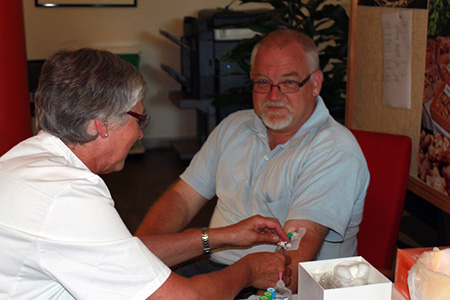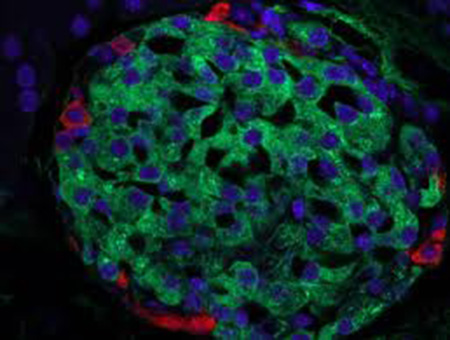Nutrition, islet cell function, Metabolic Syndrome (MeS) and Type 2 Diabetes (T2D)

Metabolic syndrome (MeS) and type 2 diabetes (T2D) constitute a global epidemic and represent a large health burden. Preventive lifestyle changes is an important way to counteract both MeS and T2D e.g. by dietary means and exercise.
We have focused on the role of dietary fat, carbohydrates and protein in the metabolic disturbances characterizing MeS and T2D. We have been involved in international collaborations that have demonstrated that increasing monounsaturated fatty acid in the diet improves insulin sensitivity (Vessby B et al 2001), diurnal blood pressure (Rasmussen et al. 2006) and postprandial lipids (Thomsen et al. 2003). More recently, we have studied the impact of a hHealthy Nordic diet – an alternative to the Mediterranean diet - on MeS. A healthy Nordic diet for 4 – 6 months has beneficial effects on lipid levels, low grade inflammation (Uusitupa M et al. 2013) and diurnal blood pressure (Brader L et al. 2014).
In long-term human intervention studies we tested if dairy foods have a protective effect against MeS and T2D. We have focussed on effects of the quality of milk fat and milk proteins, in particular whey proteins which have proven beneficial on postprandial lipaemia (Mortensen L et al. 2009, Holmer-Jensen 2011)
We have investigated if a high intake of bitter, strong tasting vegetables have beneficial impact on MeS and T2D compared to mild, sweet tasting vegetables. Secondly, how bioactive compounds in Red Clover (isoflavones) affect menopause associated bone mineral density loss and vasomotor symptoms.
Furthermore, we study effects of modified starch with a high degree of α−1.6 branching of amylopectin, of soluble β-glucan and arabinoxylan polysaccharides in MeS. We are clarifying how increased colonic butyrate production by prebiotics and probiotics alone or in synergy influences inflammatory parameters and insulin sensitivity in MeS (Hartvigsen M et al. 2014) and metabolomics show similar metabolic changes as in pigs (Nielsen KL et al. 2014).
We use a variety of methods including postprandial lipid measurements (triglycerides, remnant TG, Apo B-48), 24-hour blood pressure measurements, indirect calorimetry, VAS scores, fat and muscle biopsies, PCR, Western Blot, and metabolomic and nutrigenomic techniques to further explore the underlying molecular mechanisms and biomarker development.
Islet cell function
The research group uses in vivo and in vitro models to study the functional and molecular basis of the abnormal A- and B-cell function in diabetes. Both wild type, prediabetic and diabetic animal models (ZDF and GK rats; KKaY mice) are used. We clarifythe mechanisms behind gluco- and lipo-toxicity and have recently discovered a new potential pathophysiological mechanism i.e. aminoacidotoxicity (Liu et al. 2012).
We study new potential antidiabetic substances, particularly derived from plants e.g. stevia rhebaudiana, to clarify their effects and test if they can counteract the gluco-, lipo-, and amino-acidotoxicity. More recently our focus has been effects of bioactive substances in coffee e.g. phenolic compounds and their effect on glucose stimulated insulin secretion in clonal beta cell lines (Bhattacharya et al. 2013).
We demonstrated that isosteviol has glucose-dependent insulinotropic and glucagonostatic effects (Jeppesen et al. 2003). Furthermore, it lowers blood pressure; improve islet cell function and increase insulin sensitivity as well as increases HDL-cholesterol (Chen et al. 2012).
We explore mechanisms of action of bioactive substances on glucose metabolism, insulin sensitivity, glucagon secretion, weight and blood pressure in T2D.
Contacts
Kjeld Hermansen, Professor, MD, DMSci, kjeld.hermansen@aarhus.rm.dk
Per Bendix Jeppesen, Associate Professor, Master of Science, PhD, Per.Bendix.Jeppesen@ki.au.dk
Søren Gregersen, Associate Professor, MD, PhD., Soeren.Gregersen@aarhus.rm.dk
Merete Hartvigsen, Master of Science., PhD-student, merehart@rm.dk
Lea Brader, Master of Science, PhD-student, leabrade@rm.dk
Mette Bohl Larsen, MD, PhD-student, mettbohl@rm.dk
Anne Grethe Schioldan, MD, PhD-student, anneschi@rm.dk
Anne Cathrine S. Thorup, Master of Science, PhD-student, anne.cathrine.thorup@ki.au.dk
Ann Overgaard, Master of Science., research assistant, annovrga@rm.dk